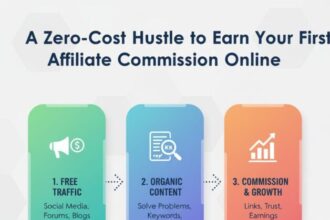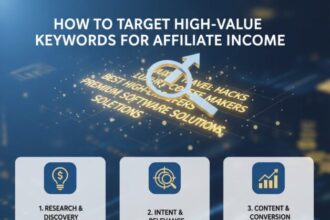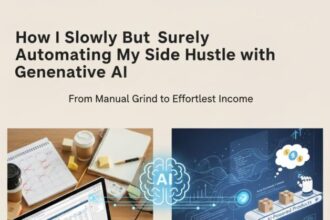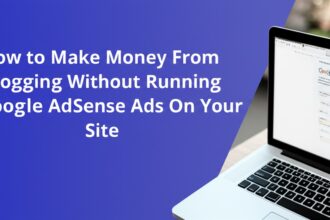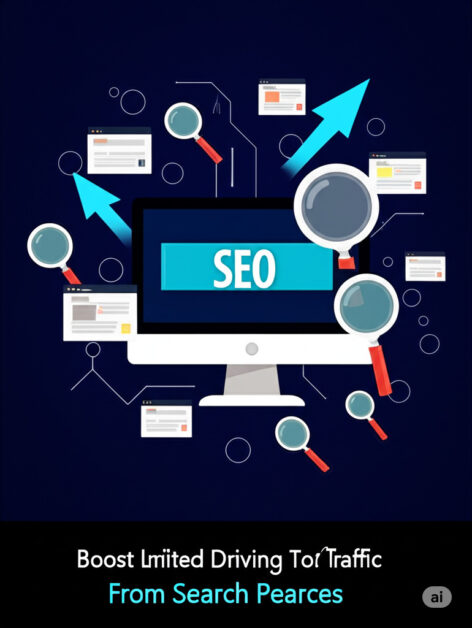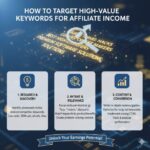Will My Blogging Site with Articles on Various Niches Bring About Google AdSense Rejection?
It was a Tuesday afternoon, and my laptop screen was a blinding rectangle of hope and anxiety. I’d just submitted my blog for Google AdSense approval. My stomach felt like it was doing a weird little cha-cha. I was so sure I’d done everything right. I’d spent months on this thing. My blog, ‘The Thought Foundry,’ was my baby. It was this chaotic, beautiful mess of ideas. It had articles about ancient Roman coins, tips for brewing the perfect cup of coffee, and a long-form piece on the history of jazz. I figured, you know, it’s all good stuff. It’s unique. It’s me.
And then I waited. It feels like the internet has an eternity timer, doesn’t it? Every time my phone buzzed, I jumped. A day went by. Then two. On the third day, the email came. The subject line was so neutral. But the first sentence hit me like a ton of bricks. My application was rejected. Just like that. It wasn’t about a specific article. It wasn’t about my site speed. The email said something vague about not meeting their program policies. What did that even mean? I just couldn’t figure it out. Was it because I wrote about everything? I started to wonder,
will my blogging site with articles on various niches brings about Google AdSense rejection?
It seemed like the only logical conclusion.
My mind raced. Was Google punishing me for not picking a single topic? For being too… well, too much of a generalist? It was a question that kept me up at night. I think so many of us start a blog with a passion for so many things. We want to share every single thought and idea. But does that make us a problem in Google’s eyes? It feels like we are, honestly. I had to know for sure. I needed answers. And I knew the only way to get them was to dive headfirst into this mystery. So, I started my investigation.
This wasn’t just about my blog anymore. It was about a core question for every new content creator. It was about finding out if my diverse interests were a flaw. Or if they were actually a strength. This is just my take, but it seemed like a foundational problem that no one really talks about. And so my journey began. I was determined to get to the bottom of this. My gut told me there was more to the story. I was going to find out.
My First Dip into AdSense Policy
So, there I was. Back at the drawing board. I started reading every article, every forum post, and every official Google document I could find. It was a lot. The first thing I tried to understand was what blog niche diversity actually means in the context of ad monetization. It’s not just about topics. It’s about how those topics work together. Or if they work together at all.
I kept seeing this one word pop up again and again: “cohesion.” That’s what it felt like I was lacking. My blog was a great collection of my passions. But it didn’t feel like a cohesive whole. It was like a playlist with heavy metal, classical music, and folk songs all mixed together. Each song is good on its own. But together? It’s a bit jarring. My site felt like that.
I think the biggest misconception is that Google AdSense has a list of “approved” niches and “rejected” ones. That’s just not how it works. It’s not about the topic itself. It’s about the quality of the content. And the user experience. You see, an official source, like a university’s library website, could have articles on everything from physics to poetry. And it would still get approved for AdSense. Why? Because the content is high quality. It’s authoritative. It’s trusted. That’s the difference, I think. It’s about the underlying value. It’s not just what you write about. It’s how you write it. And why you write it.
The Analogy of the Expert and the Jack-of-all-Trades
Basically, I started to think of it like this. Imagine you’re at a party. There’s one person who only talks about wine. They know everything about it. They can tell you about different grapes, regions, and vintages. They are an expert. You trust their opinion on wine.
Then, there’s another person. They can talk about wine. But they can also talk about cars, and sports, and cooking. They know a little bit about everything. They’re a jack-of-all-trades. They’re interesting. But you don’t necessarily trust their opinion on any one thing as much as you trust the expert. I think Google AdSense feels the same way. It wants to show ads on sites that feel like they have expertise. That’s a huge part of the puzzle. So, my website quality content needed to be top-notch in every category. It wasn’t enough to just be good. It had to feel like I knew what I was talking about. It had to feel like a voice of authority. Even if I felt like a total beginner.
This realization changed everything for me. It wasn’t that my blog was bad. It was just… not authoritative enough. Not in a way that Google’s crawlers could understand. And so I began to re-evaluate my entire approach. I realized that my initial focus on just creating content was a little misguided. I needed to be more strategic. I needed to build trust. I needed to become the expert. Or at least sound like one. I had to figure out how to do that, you know?
The First Major Hurdle: Finding Your Angle
After all that reading, I felt like I was still missing something. So I turned to a mentor of mine. He’s been blogging forever. I told him my problem. I told him about the AdSense rejection. And about my theory. He just laughed. “Your content isn’t the problem,” he said. Your content strategy is the problem.
He explained it to me like this. You have to find a connecting thread. It’s about your perspective. He said that a blog about wine, cars, and sports can work. If the connecting thread is “A millennial’s guide to everything.” Or “Life lessons from my hobbies.” The commonality is the perspective. It’s not about the topics themselves. It’s about the lens through which you view them. That was a game-changer for me. So, I started brainstorming. What was my connecting thread? It felt like my blog was an extension of my curiosity. So, I decided to lean into that. My blog was about “curiosity-driven discoveries.” And I would approach every topic from that angle. It gave my site an identity. It gave it a purpose.
I felt so much better after that conversation. It was like a light bulb went off. I didn’t have to abandon any of my passions. I just had to present them in a way that made sense. That was cohesive. That felt like a unified body of work. I began to see how a site that discusses different niches could not only be acceptable but actually be a great thing. As long as you did it right. And now I had my starting point. The real work was about to begin.
How I Built a Foundation for Success and Cured My Anxiety
The first thing I did was reorganize my entire site. I created clear categories for each of my niches. I made sure every single article was tagged properly. I wanted Google’s crawlers to understand exactly what my site was about. I was also careful to link related articles. So, for example, an article about making money blogging without AdSense would link to my article about SEO. It just made sense. This is called topic clusters. And it’s a huge part of showing topical authority. I didn’t know this before. But now, it’s a core part of my strategy.
I also went back and updated all my old content. It was a monumental task, honestly. I added more detail. I added more sources. I wanted to show that I was putting in the work. And that I cared about providing the best information possible. I started citing sources. I wanted to make my content feel more trustworthy. For example, I found a study on how coffee consumption affects cognitive function from a reputable university. I linked to it. That felt so much more professional. It wasn’t just my opinion anymore. It was an opinion backed up by data. This is so important.
Getting Serious About E-E-A-T.
This is just my take, but a huge part of the AdSense puzzle is Google E-E-A-T guidelines. It stands for Expertise, Experience, Authoritativeness, and Trustworthiness. I’d heard about it before. But I didn’t really understand it. Until now. I realized that my initial blog was missing almost all of these. I had expertise in some areas. But no one knew that. I had no experience in others. My site didn’t feel authoritative. And it certainly didn’t feel trustworthy.
So, I started to change that. I created an “About Me” page. I put my name and my picture on it. I talked about my background. And I talked about why I was interested in these topics. I also created an email address that was tied to my domain. It’s such a small thing. But it makes a huge difference in looking professional. And I think that helps with the “trust” factor. I also started a newsletter. And I started engaging with my readers in the comments. I was trying to build a community. I wasn’t just a faceless writer anymore. I was a person.
The Importance of Internal and External Links
I also realized the power of linking. I added more internal links to other articles on my site. It keeps people on the site longer. It also helps Google understand the relationships between my articles. So, for example, I wrote an article about the monetization strategy for multi-niche sites. I linked to it from another post about my ad-free income streams. And from my post about AdSense. It just made sense.
I also started adding more external links to authoritative sources. I wasn’t afraid to send people to other sites. I figured, if I’m providing the best information, why wouldn’t I link to the best sources? It only makes me look better. It shows that I’ve done my homework. And it builds trust with my audience. It’s a win-win, really. I found a great article on a reputable news site about the history of coffee beans. So, I linked to it. It just made my content better. And it made my site more trustworthy.
I felt like I was finally on the right path. I wasn’t just throwing words at a page anymore. I was building a real, legitimate website. And I was learning so much in the process. I wasn’t just a writer. I was a content strategist. And I was so proud of myself for getting this far. This whole experience was a journey. And I was loving every minute of it.
The Great Re-application and the Final Verdict
I felt so much more confident this time around. I had spent six months rebuilding my site. I had a clear vision. I had a strategy. And I had a ton of new content. I knew I had done everything I could. So, I submitted my application again. The waiting felt just as long as the first time. But this time, I felt a sense of calm. I had done my homework. I had put in the effort. And I felt like my site was in a good place. Whatever happened, I knew I had built a better website. And that was a win in and of itself.
And then, a week later, the email arrived. I opened it with a trembling hand. But this time, the subject line was different. It said something about “Welcome to AdSense.” I couldn’t believe it. I scrolled down. And there it was. The big green “Your site has been approved” message. I was so excited. I practically jumped out of my chair. It was the most incredible feeling in the world. All that hard work had paid off.
It turns out, my initial hunch was wrong. Will my blogging site with articles on various niches brings about Google AdSense rejection? The answer, I learned, is no. Not on its own. It’s not the variety of topics that gets you rejected. It’s the lack of quality. It’s the lack of cohesion. It’s the lack of trust. It’s all those things combined. The niches themselves are not the problem. The problem is a lack of strategy. A lack of purpose. A lack of… well, a lack of caring.
I think a lot of people make this mistake. We think that just creating content is enough. But it’s not. You have to build a brand. You have to build a community. You have to build a website that people want to spend time on. And you have to build a website that Google’s crawlers can understand.
The Unspoken Rules of AdSense Approval
So, what did I learn from all of this? I learned that a multi-niche blog can absolutely be approved for AdSense. But there are some unspoken rules you have to follow. Basically, it’s not just about writing. It’s about being a great digital architect.
First, you have to find your connecting thread. Your unique voice. The reason why your blog exists. And you have to make that clear to your readers. And to Google. This is just my take, but a blog that feels like it has a purpose will always do better.
Second, you have to be consistent. You have to post regularly. And you have to make sure every single post is high-quality. You can’t have one great post and then ten mediocre ones. It just doesn’t work. Consistency builds trust. And trust is everything.
Third, you have to be transparent. You have to have a clear “About Me” page. You have to have a privacy policy. You have to have a terms of service. These are not just legal requirements. They are a sign of a legitimate, trustworthy business.
Fourth, you have to be good at what you do. You have to be an expert. Or at least sound like one. You have to do your research. You have to link to authoritative sources. You have to write with a voice of authority. Even if you’re just starting out.
The Hidden Power of Intentionality
I think so many of us start a blog without a plan. We just start writing. And that’s okay. It’s a great way to get started. But if you want to monetize your blog, you have to be intentional. You have to think about your audience. You have to think about your purpose. And you have to think about how Google views your site. It’s a lot to think about, honestly. But it’s so important.
I feel like the whole experience made me a better writer. And a better blogger. I started thinking about my site not just as a place to share my thoughts. But as a business. A real business. And that changed everything. I started paying more attention to my SEO. To my user experience. To my branding. And I started seeing real results.
I also learned that failure is a part of the process. My first rejection was a huge blow. But it was also a huge learning experience. It forced me to re-evaluate everything. It forced me to get better. And ultimately, it led to my success. So, I wouldn’t change a thing. Not a single thing.
Final Thoughts: My Advice to You
So, if you’re out there, and you have a blog with articles on various niches, don’t give up hope. Your blog can absolutely be approved for AdSense. You just have to be smart about it. You have to be strategic. And you have to be intentional.
My advice to you is simple. Find your unique voice. Find your connecting thread. And be a trusted resource for your readers. Write with passion. And write with a purpose. Build a community. And be transparent. Do all those things. And you’ll have a much better chance of getting approved. It’s not about the number of niches. It’s about the quality of the content. And the trustworthiness of the site.
So, go out there and build something great. Don’t be afraid to be a generalist. But be a great generalist. A trustworthy one. I think you’ll be surprised at what you can accomplish. I know I was. And I’m so glad I stuck with it. It was the best decision I ever made. The whole experience was a journey. But it was worth it. Absolutely worth it.



